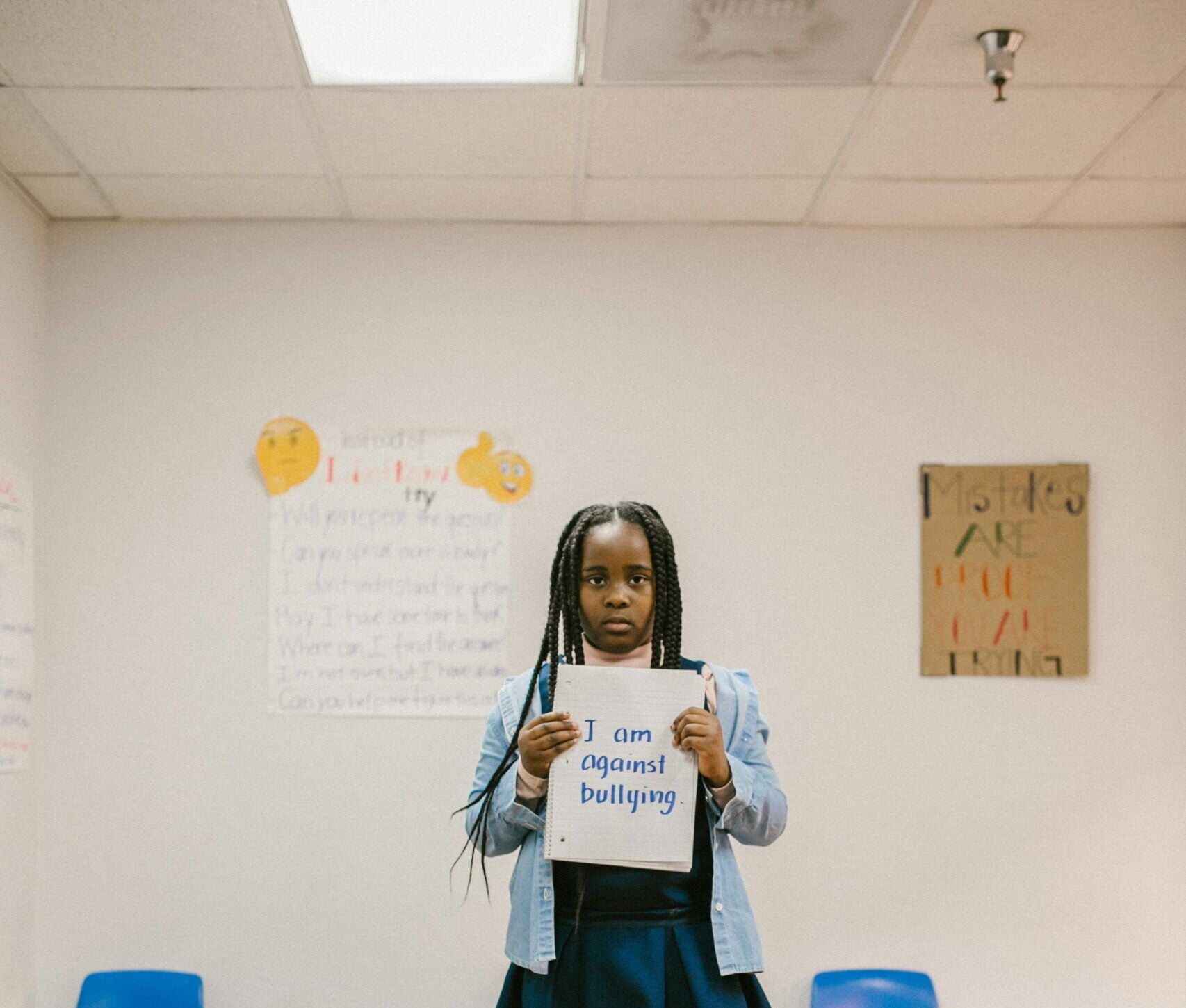Most times, when children and teens get bullied, they remain silent and say nothing about it. They keep it a secret from their parents, teachers, and adults because they think they might get into more trouble.
In many cases, the problem becomes worse. So, as a parent or authority figure in a young person’s life, you need to look out for signs of bullying and have a conversation about it with them to avoid trauma and overcome the problem.
When having a conversation about bullying with your child or teen, you can start by explaining what a bully is. A bully is anyone who hurts other people on purpose.
Let them know that bullies can harm others using their words. They can do this by calling other kids names or spreading rumors about them. They can also bully others by striking, pushing, or shoving. In addition, bullying can happen online, with bullies posting false, vile, and violent things about others.
A bully’s purpose is usually to gain power over other individuals. Bullying usually involves someone causing repeated harm to others. Ensure that your children understand that bullying goes beyond someone being cruel to them once. Bullies generally cause long-term harm to others. They may even inspire other people to take part.
Recognizing the Signs of Bullying in Children and Teens
Sometimes, it can be difficult to know when someone is harassing your child or if they are the ones hurting others. So watch out for these markers to know whether you need to talk to them about bullying:
- Physical Signs: Your child might have visible signs of bullying, like unexplained bruises, scratches, and cuts. Some of their belongings might also be torn, damaged, or missing. In addition, they might complain about headaches, stomachaches, or pain in other body parts.
- Behavioral Signs: Some behavioral markers of bullying include a lack of enthusiasm for school and having a sad countenance when they return home. Others include withdrawing from friendships and social activities. Reduced self-esteem, changes in sleeping or eating patterns, and exhibition of anxious behaviors could also be signs that someone is bullying your children and teens.
- Other signs that someone may be bullying your child include declining academic performance, risky behaviors, getting into fights, erratic mood swings, or self-harm.
Initiating the Dialogue
When initiating a dialogue about bullying with your child or teen, there are a few factors to keep in mind such as:
- Choosing the Right Moment: You don’t have to wait for a bully to target your children and teens before having a conversation about it with them. You ask for their opinions on cases in which children hurt other kids. Then, you can teach them how to handle similar issues if needed.
But if someone is hurting your child at school and you’d like to talk with them about it, consider waiting until they’re feeling calm and relaxed. Let them take a cool bath and eat a hot and tasty meal. Afterward, you can approach them and start a dialogue about the problem.
- Creating a Safe and Open Environment: Your children and teens need to know they’re not in trouble when you talk to them about bullying. Make sure you’re relaxed and speaking calmly. Let them know how much you care about them and want to keep them safe. Explain that they can always come to you whenever they’re experiencing a problem.
- Approaches to Avoid: Never force your children and teens to open up to you about the problem. Trying to forcefully pry information out of them will only make them clam up. While your child is speaking, ensure that you listen with the goal of understanding, not to respond and cast blame. Don’t accuse them of causing the problem or handling it incorrectly.
Also, if someone is bullying your child or teen, never assume that the problem will go away on its own. Picking on or teasing a child is never acceptable. Assisting your child in dealing with their bully will boost their confidence and keep an unpleasant situation from worsening.
Effective Communication Strategies
Your child’s age should determine how you start a conversation about bullying with them. If your child is between the ages of 4 and 8, consider using their favorite television shows or a picture book to demonstrate your point.
But if you have an older child, you can use real-life bullying cases like the ones displayed in newspapers or on TV. Doing so will educate your kids about how to treat others. It will also teach them what to do when someone causes them distress. Consider these strategies when talking to your kids about bullying:
- Active Listening Techniques: As you already know, the human mind tends to wander a lot, and this tendency can be annoying, especially when we need to pay attention to important details. Therefore, active listening is a skill that every individual needs to learn and master.
When conversing with your ward about bullying, ensure that you listen to what they’re saying and try to understand them. Tuning them out accidentally or letting your mind wander, thereby missing crucial details, could give them the impression that you’re not taking their problems seriously. Look into their eyes while talking to them so they’ll know you’re paying attention to what they’re saying.
- Encouraging Openness and Honesty: Asking your child questions about bullying and encouraging them to open up to you about any problems they face at school or in the neighborhood lets them know that you take their issues seriously. It also reassures children that they’re in a cooperative, safe, and welcoming environment.
Tell your child or teen that talking about bullying is acceptable and important. Encourage them to speak with you and their teachers when they have any particular worries about classroom bullying. Listen with rapt attention. Validate their feelings. Get essential details about those involved. Offer assistance and discuss solutions. In addition, remember to ask them follow-up questions later.
Empowering Children and Teens
If you notice that your children or teens are victims of bullying, it’s essential to teach them ways to overcome it. Ignoring the problem or hoping it will go away on its own might cause more harm to your ward. So consider doing the following to empower your kids:
- Building Confidence and Resilience: Children or teens can be victims of bullying because they appear or behave differently from other people. They might speak or dress differently from the norm. Other things that can make your child a victim of bullying are getting better grades than others or having hobbies that the bully considers unusual.
It’s important to help your children understand that it’s okay to be different and that there’s nothing wrong with them. Suppose someone is bullying your child because they are ‘strange’. Tell your child that the exact traits the bully teases are what make them beautiful, unique, talented, and strong.
Teach your kids or teens to be proud of who they are and how they look. Help them understand that most bullies are suffering, so they try to hurt others.
Offer your children and teens positive reinforcement to help them resist the bully’s bad effects. Remind them that you love them. Also, emphasize the specific qualities you admire about them and offer praises they can use to combat the bully’s insults.
- Teaching Assertiveness Skills: Being assertive means showing confidence and boldness without acting aggressively. When talking to your children and teens about bullying, it’s essential to teach them how to act boldly when someone tries to hurt them. Tell them to practice saying ‘no’. Whenever someone tells them to do something they don’t like, they need to look the person in the eyes and say no confidently. Tell them to say it clearly and loud enough for the bully to hear.
Your children and teens can also use phrases like “stop that. I don’t like that” or “leave it alone. It’s mine”. Sometimes, in bullying cases, they might need to repeat themselves. Let them continue repeating the same sentence in an assertive tone until the bully gets the point.
Also, tell your kids to always stand in a way that makes them feel powerful and strong while talking to their bullies. In addition, they should practice saying positive words to themselves, such as ‘I’m a brave and confident person.’
- Reaching Out to Your Child’s School: If the bullying occurs at your child’s school, contact the principal, tutor, coach, or teacher and tell them about the problem. The bully may be targeting other kids, too. Notifying the school might keep the problem from escalating.
Bottom Line
There are various ways to know if someone is bullying your children and teens. In most cases, they display behaviors that are uncharacteristic of them. They could have visible marks on their bodies or act withdrawn from most activities. Their attitude at home might also be different.
So, you need to talk to them about it to avoid trauma, stop the harassment, and protect other kids. Ensure that you make them feel safe and relaxed at home so that they can open up.
Also, be sure to listen with your full attention. Offer them loving and encouraging words. Tell them always to remember to speak to their bullies boldly and stand their ground until the bully disappears.
You can take the intervention process further and talk to the school authorities about it. Never wait for the problem to resolve itself on its own! Addressing your child’s problem with bullies will strengthen the bond between you and create space for them to open up about other difficult topics if the need arises.
Further Resources
Suppose your child is getting bullied or bullies others, and you need more support handling it. Consider communicating with other parents on online forums to learn how they deal with the issue. You can also talk to an experienced professional about it.


